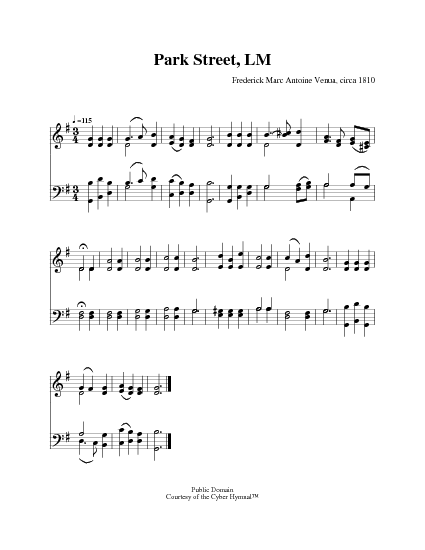- |
User Links
Blessing God for His Goodness to Soul and Body

Bless, O my soul, the living God
Author: Isaac Watts (1719)Published in 299 hymnals
Printable scores: PDF, MusicXMLAudio files: MIDI
Representative Text
1. Bless, O my soul, the living God,
Call home thy thoughts that rove abroad,
Let all the pow'rs within me join
In work and worship so divine,
In work and worship so divine.
2. Bless, O my soul, the God of grace;
His favours claim thy highest praise:
Why should the wonders He hath wrought
Be lost in silence and forgot,
Be lost in silence and forgot?
3. ’Tis he, my soul, that sent His Son
To die for crimes which thou hast done;
He owns the ransom and forgives
The hourly follies of our lives,
The hourly follies of our lives.
4. The vices of the mind He heals,
And cures the pains that nature feels;
Redeems the soul from hell, and saves
Our wasting life from threat’ning graves,
Our wasting life from threat’ning graves.
5. Our youth decayed, His power repairs;
His mercy crowns our growing years:
He satisfies our mouth with good,
And fills our hopes with heav’nly food,
And fills our hopes with heav’nly food.
6. He sees th’oppressor and th’oppresst,
And often gives the suff’rers rest;
But will His justice more display
In the last great rewarding day,
In the last great rewarding day.
7. His pow'r he showed by Moses’ hands,
And gave to Israel his commands;
But sent His truth and mercy down
To all the nations by his Son,
To all the nations by his Son.
8. Let the whole earth His power confess,
Let the whole earth adore His grace;
The Gentile with the Jew shall join
In work and worship so divine,
In work and worship so divine.
Source: Psalms and Hymns and Spiritual Songs #4
Author: Isaac Watts
 Isaac Watts was the son of a schoolmaster, and was born in Southampton, July 17, 1674. He is said to have shown remarkable precocity in childhood, beginning the study of Latin, in his fourth year, and writing respectable verses at the age of seven. At the age of sixteen, he went to London to study in the Academy of the Rev. Thomas Rowe, an Independent minister. In 1698, he became assistant minister of the Independent Church, Berry St., London. In 1702, he became pastor. In 1712, he accepted an invitation to visit Sir Thomas Abney, at his residence of Abney Park, and at Sir Thomas' pressing request, made it his home for the remainder of his life. It was a residence most favourable for his health, and for the prosecution of his literary… Go to person page >
Isaac Watts was the son of a schoolmaster, and was born in Southampton, July 17, 1674. He is said to have shown remarkable precocity in childhood, beginning the study of Latin, in his fourth year, and writing respectable verses at the age of seven. At the age of sixteen, he went to London to study in the Academy of the Rev. Thomas Rowe, an Independent minister. In 1698, he became assistant minister of the Independent Church, Berry St., London. In 1702, he became pastor. In 1712, he accepted an invitation to visit Sir Thomas Abney, at his residence of Abney Park, and at Sir Thomas' pressing request, made it his home for the remainder of his life. It was a residence most favourable for his health, and for the prosecution of his literary… Go to person page >Text Information
| First Line: | Bless, O my soul, the living God |
| Title: | Blessing God for His Goodness to Soul and Body |
| Author: | Isaac Watts (1719) |
| Meter: | 8.8.8.8 |
| Language: | English |
| Copyright: | Public Domain |
Notes
Bless, O my soul, the living God. I. Watts. [Ps. ciii.] This is Pt. i. of his L.M. version of Ps. ciii., first published in his Psalms of David, &c, 1719, Pt. ii. being, "The Lord, how wondrous are His ways.” Both parts are in common use both in Great Britain and America. Pt. i. is in 8 stanzas, and Pt. ii. in 9 stanzas of 4 lines. In addition there are abbreviations of Pt. i., and a cento from Pts. i. and ii. in common use The most popular arrangement in modern American hymnals is that in Songs for the Sanctuary, N. Y., 1865, Laudes Domini, N. Y, 1884, and many others. It is composed of stanzas i., ii., iii., and viii., slightly altered. Other arrangements are also found both in Great Britain and America. A cento from Pts. i. and ii. appeared in Bickersteth's Christian Psalmody, 1833, and is made up of Pt.i. stanzas i.—iii., Pt. ii. stanzas iv. and v., and an additional stanza from another source.
-- John Julian, Dictionary of Hymnology (1907)
Tune
MELCOMBE (Webbe)Also known as: ST. PHILIPS BENEDICTION GRANTON NAZARETH MELCOMBE was first used as an anonymous chant tune (with figured bass) in the Roman Catholic Mass and was published in 1782 in An Essay on the Church Plain Chant. It was first ascribed to Samuel Webbe (the elder; b. London, England, 1740; d.…
PARK STREET


 My Starred Hymns
My Starred Hymns





